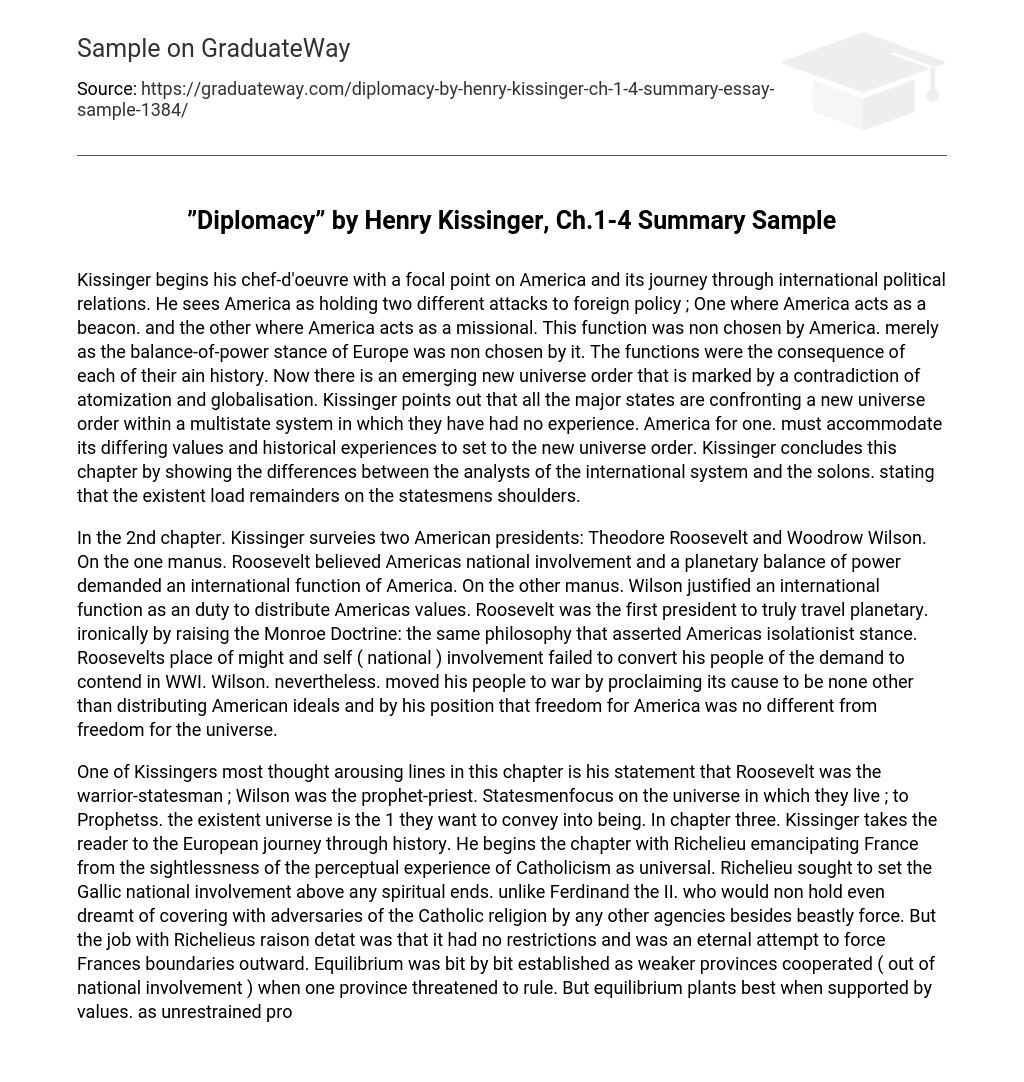Kissinger begins his chef-d’oeuvre with a focal point on America and its journey through international political relations. He sees America as holding two different attacks to foreign policy ; One where America acts as a beacon. and the other where America acts as a missional. This function was non chosen by America. merely as the balance-of-power stance of Europe was non chosen by it. The functions were the consequence of each of their ain history. Now there is an emerging new universe order that is marked by a contradiction of atomization and globalisation. Kissinger points out that all the major states are confronting a new universe order within a multistate system in which they have had no experience. America for one. must accommodate its differing values and historical experiences to set to the new universe order. Kissinger concludes this chapter by showing the differences between the analysts of the international system and the solons. stating that the existent load remainders on the statesmens shoulders.
In the 2nd chapter. Kissinger surveies two American presidents: Theodore Roosevelt and Woodrow Wilson. On the one manus. Roosevelt believed Americas national involvement and a planetary balance of power demanded an international function of America. On the other manus. Wilson justified an international function as an duty to distribute Americas values. Roosevelt was the first president to truly travel planetary. ironically by raising the Monroe Doctrine: the same philosophy that asserted Americas isolationist stance. Roosevelts place of might and self ( national ) involvement failed to convert his people of the demand to contend in WWI. Wilson. nevertheless. moved his people to war by proclaiming its cause to be none other than distributing American ideals and by his position that freedom for America was no different from freedom for the universe.
One of Kissingers most thought arousing lines in this chapter is his statement that Roosevelt was the warrior-statesman ; Wilson was the prophet-priest. Statesmenfocus on the universe in which they live ; to Prophetss. the existent universe is the 1 they want to convey into being. In chapter three. Kissinger takes the reader to the European journey through history. He begins the chapter with Richelieu emancipating France from the sightlessness of the perceptual experience of Catholicism as universal. Richelieu sought to set the Gallic national involvement above any spiritual ends. unlike Ferdinand the II. who would non hold even dreamt of covering with adversaries of the Catholic religion by any other agencies besides beastly force. But the job with Richelieus raison detat was that it had no restrictions and was an eternal attempt to force Frances boundaries outward. Equilibrium was bit by bit established as weaker provinces cooperated ( out of national involvement ) when one province threatened to rule. But equilibrium plants best when supported by values. as unrestrained provinces prosecuting their national involvements becomes rather lawless.
Kissinger continues the journey through European diplomatic negotiations from the Congress of Vienna. the post-Napoleonic Wars assembly that maintained a physical and moral equilibrium. Europe experienced the longest period of peace its of all time known following the Congress of Vienna. Many factors may account for the phenomenon. including the fact that they did non strip the also-ran. France. of all its conquerings. Austrias negotiant. Metternich. played a important function in pull offing the new international system and in the Holy Alliance. The security lasted until Napoleon III was granted a function in which Russia played as Protector of the Christians in the Ottoman Empire. Napoleon III sought to destruct the Holy Alliance by weakening Russia and hence. he brought France out of isolation to contend in the Crimean War. Thus. the moderateness of European diplomatic negotiations invoked by Metternich. was washed off.





